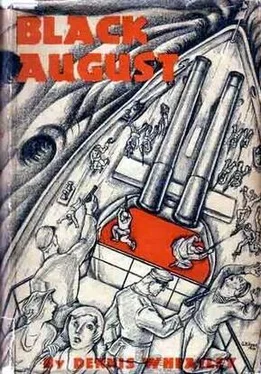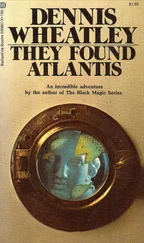Black August
by Dennis Wheatley
1
The Prophet of Disaster
The bright July sunshine gave the ultimate degree of brilliance to the many coloured flowers in the stationmaster's garden. From a field, not far away the sweet scent of clover drifted in through the windows of the waiting train, and in the drowsy heat the hum of insects came clearly to the man and girl seated in one of the third class compartments.
They were strangers and had not spoken, yet he had been very conscious of her presence ever since she had scrambled in, just as the train was leaving Cambridge.
For a time his paper had absorbed him. It seemed that the curtain had gone up on the last act of that drama entitled: 'The Tragedy of Isolation,' which the United States Government forced by the pressure of their less educated masses had produced in the middle 193O's.
From that time onwards America had been driven more and more in upon herself, while Europe rotted, racked and crumbled. Now, faced with critical internal troubles of their own, the States had finally closed the door upon the outside world by a sweeping embargo; prohibiting all further exports to bankrupt Europe which could no longer pay, even in promises; refusing entrance on any terms to all but their own nationals, and enforcing a rigid censorship on their news.
The girl was staring out of the window at a placid cow, which ambled down a lane beyond the station under the casual guidance of a ragged boy, who swished now and then at the hedgerows with his stick. As the young man glanced at her his quick blue eyes took in the headline of the paper lying at her side:
'FURTHER SABOTAGE BY POLES MORE GERMAN GARRISONS WITHDRAWN'
and his mind leapt back to the previous summer. With superb generalship, the veteran officers of the German army had carried out a classic campaign, subduing the whole of Poland in the short space of ten weeks while the French army looked on, biting their nails with fury yet impotent to help their allies, being themselves in the throes of that revolution which terminated the nine months' reign of the Fascist puppet king, Charles XI of France.
And now Poland was slowly driving out the conqueror compelling the Germans to concentrate their forces in the larger towns by interference with supplies, the destruction of waterworks, electric plant, railway lines and bridges.
'Where will it all end!' he speculated for the thousandth time; starvation rampant in every city in Europe millions of unemployed in every country eking out a miserable existence in so called Labour Armies on state rations; Balkan and Central European frontiers disintegrating from month to month, while scattered, ill equipped armies fought on broken fronts, for whom, or for what cause, they now scarcely knew; Ibn Saud's dynasty dominant in the near East, gobbling up the Mesopotamian kingdoms created by Britain after the first Great War, and, with the simple, clear cut faith of the Koran for guide, turning their backs contemptuously upon their protests of the Christian powers, now impotent to stay their Moslem ambitions.
France was rapidly becoming Communist; Germany in a desperate plight, her commerce at a standstill, and only kept from open Bolshevism by martial law.
England had kept out of the strife for the last ten years; the will of the people for once dominating the folly of the politicians, but creeping poverty was driving her horribly near the precipice, and if the United States could no longer help, another month might see her too in a state of anarchy.
Looking out upon the little wayside station and the country all about it flooded with sunshine, serene and peaceful, it seemed impossible yet he knew it to be true.
The clang of a couple of milk cans farther down the platform shattered the silence, a whistle blew, and the train an unhurried local chugged on in the direction of Ipswich.
Weary unto death with his thoughts of folly, bloodshed and disaster, the young man glanced again at the girl and caught her eye for a second. The thought that she might be willing to talk offered a most pleasing distraction. He pulled off his soft hat and flung it on the seat beside him, disclosing a crop of auburn hair; then he leaned forward, his hands clasped between his knees and smiled at her:
'I see you've finished your paper am I being rude, or would it amuse you to talk for a bit?'
She regarded him steadily for a moment from beneath half lowered lids. He looked a nice young man blue eyed and slightly freckled; he wore a suit of brown plus fours, ancient but still retaining the cachet of a good tailor and his hands were well cared for.
'Why not?' she said lightly; 'being a lazy person I left it to the very last moment to get up this morning and forgot my book in the rush to catch the train, so you may fill the gap and entertain me if you like!'
'Splendid! My name's Kenyon Wensleadale what's yours? That is unless you'd rather remain anonymous?'
She shook her dark head: 'It is Ann Croome.'
'What a nice old fashioned name,' he said, 'and may I ask if Mistress Ann Croome often travels on this antiquated line?'
'No, only I've been staying with a friend in Cambridge one of the four year students at Girton, and I'm spending the rest of my holiday at Orford; the air buses were full, so I thought it would be quicker to come this way than via London.'
'It is too; though not much since they've fitted the main lines with the mono rail. Were you at Girton yourself?'
'Yes, came down last year I'm a full blown secretary now!'
'And how do you like it?'
'It's a bore sometimes, especially on the sunny days; but at least it means independence. The only other alternative is a life of good works on a microscopic allowance with an aged uncle at Orford; in fact, if my firm crashes I shall have no choice, and I'm afraid they may before long.'
'Things are pretty bad, aren't they?'
'Bad?' Ann's dark eyebrows lifted, wrinkling her broad forehead, 'they couldn't be much worse!'
'I don't know,' he said thoughtfully, 'I'm afraid they are going to be before we're very much older. This American business…"
'Oh, I'm sick to death of America! The whole of my young life the papers have been crammed with what America is going to do and what America hasn't done and what the jolly old Empire is going to do if America doesn't!'
'Yes, that's true. Still, this embargo is going to be the very devil; it looks like the last straw to me.'
'I don't know; if we took a leaf out of their book and stopped lending money to the bankrupt countries, things might improve a lot.'
'Ah, that's just the trouble. England isn't self supporting, and if we can't keep our trade with the outside world we’re done.'
'I wonder? Germany is sticking to her moratorium, and so is Spain. People are dying by the thousand every day in Central Europe! they can't buy bread, let alone the things we are making, and the Balkans are in such a mess that the papers say we have even refused to supply them with any more munitions to carry on their stupid war. So what is the good of all this commercial nonsense if there are no customers left who can pay for what they buy?'
'There is still the Empire the Argentine Scandinavia Belgium, Holland, Italy lots of places.'
She frowned. 'They say the Italian state ration just isn't enough to live on.'
'I know, but Mussolini laid the foundations of the new Italy so well that they will pull through somehow. He is one of the few who will survive when the history of this century comes to be written.'
'And Lenin.'
He laughed. 'Lenin, eh? you know, you don't look like a Bolshevik.'
'Don't I?' she smiled mischievously, 'and what do Bolsheviks look like? Are you one of those people who imagine that they all have straggly hair and dirty finger nails?'
Читать дальше












